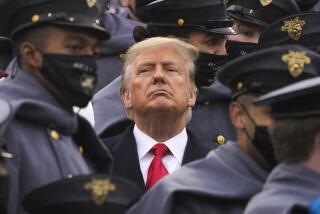The Power Paradox
Conventional wisdom holds that Sept. 11 “changed everything,” particularly with regard to foreign policy. But long before the Al Qaeda attacks, the key foreign policy debate centered on the issue of U.S. hegemony, our geopolitical dominance by virtue of overwhelming military and economic capabilities. Since Sept. 11, hegemony has become an even more crucial issue.
By removing the only counterweight to U.S. power from the geostrategic equation, the Soviet Union’s collapse vaulted the United States into the seemingly enviable position of global preeminence. Since the Cold War’s end, three successive administrations--Bush I, Clinton, and Bush II--have explicitly embraced the strategic objective of maintaining this hegemony. But it’s a dangerous business.
Hegemonic powers are like monopolistic corporations. Monopolists--and hegemons--don’t like competition, and they act strategically to prevent the emergence of rivals. The new National Security Strategy of the United States that President Bush presented to Congress last month is clear on this point, stating that the objective of American strategy is to prevent any other state from building up military capabilities in the hope of “surpassing, or even equaling, the power of the United States.” American strategy aims not only to thwart the emergence of the “usual suspects” (a rising China or a resurgent Russia), but also the rise to great power status of America’s principal Cold War allies (Western Europe and Japan). To ensure that the U.S. remains “king of the hill, top of the heap” geopolitically, the Bush National Security Strategy constitutes the U.S. as a kind of global “Department of Pre-Crime” empowered to act preemptively to cut down future rivals before they become actual ones.
So, why is this a problem? If power matters in international politics--and it matters a lot--why should the United States not seek to amass overwhelming power? Can a country ever, to paraphrase the duchess of Windsor, be too rich, too powerful or too well-armed?
Some armchair strategists residing in leading universities and think tanks--the so-called “offensive realists”--argue that hegemony is important for maintaining world order, that international systems dominated by a hegemonic power are more stable and peaceful than systems where power is more or less equally distributed among multiple great powers. They believe that the U.S. will attain the greatest security in a world where there are no other great powers. Needless to say, offensive realism has found a receptive audience among the current crop of U.S. policymakers.
There is a problem with this picture, however. The historical record shows that in the real world, hegemony never has been a winning grand strategy. The reason is simple: The primary aim of states in international politics is to survive and maintain their sovereignty. And when one state becomes too powerful--becomes a hegemon--the imbalance of power in its favor is a menace to the security of all other states. So throughout modern international political history, the rise of a would-be hegemon always has triggered the formation of counter-hegemonic alliances by other states.
History is littered with the wreckage of states that sought hegemony, and were defeated by such alliances--the Hapsburg Empire under Charles V and Philip II, France under Louis XIV and Napoleon, Victorian Britain, Germany under Hitler. The big question is whether the same fate will befall a hegemonic America, or whether the United States somehow is exempt from the lessons of history.
U.S. strategists believe that “it can’t happen to us,” because the United States is a different kind of hegemon, a benign hegemon that others will follow willingly due to the attractiveness of its political values and culture. While flattering, this self-serving argument misses the basic point: Hegemons are threatening because they have too much power. And it is America’s power--not the self-proclaimed benevolence of its intentions--that will shape others’ response to it. A state’s power is a hard, measurable reality, but its intentions, which can be peaceful one day but malevolent the next, are ephemeral.
Hegemony’s proponents claim that the United States can inoculate itself against a backlash by acting multilaterally. But other states are not going to be deceived by Washington’s use of international institutions as a fig leaf to cloak its ambitions of dominance. And in any event, there are good reasons why the U.S. should not reflexively embrace multilateralism. When it comes to deciding when and how to defend American interests, Washington should want a free hand, not to have its hands tied by others.
Today, the United States stands at the zenith of its power. But there is a real paradox to American hegemony. On the plus side, Washington has the military muscle, economic power and diplomatic clout to assemble an impressive coalition against terrorism. And, although there is evident unease about the administration’s Iraq policy, Washington has plenty of carrots--and sticks--to induce support from states such as France, Russia and U.S. client regimes in the Middle East that harbor deep misgivings about the wisdom of Washington’s use of military power to bring about regime change in Baghdad. The United States is too powerful, and others too weak, for its actions to be opposed or constrained successfully.
But things often change quickly in international politics, and America’s displays of power today could well come back to haunt Washington tomorrow. The lessons of the past tell us that the very fact of America’s overwhelming power is bound to produce a geopolitical backlash. Even during the 1990s, other leading powers--Russia, China, France, India--repeatedly called attention to the dangers of American “hyperpower” and called for the creation of counterweights to U.S. hegemony. The debate about Iraq has galvanized others’ fears that a too-powerful U.S. will act in ways detrimental to their interests. The nasty tiff between the administration and German Chancellor Gerhard Schroeder, and the clear reluctance of France and Russia to support a U.S. military campaign aimed at overthrowing Iraqi President Saddam Hussein, illustrate the worries even our allies have about American hegemony.
American strategists may think that U.S. hegemony is consolidated firmly and is beyond challenge. But this surely is strategic myopia. It is a pretty safe bet that in the first few decades of the 21st century, U.S. primacy will prompt the same response that previous hegemonic aspirants provoked: New great powers will emerge to offset U.S. power, and they will coalesce to check America’s ambitions.
Terrorist attacks like Sept. 11 are also, in themselves, a form of blowback against American geopolitical preeminence. Despicable and brutal though they were, Al Qaeda’s actions were coolly calculated to achieve well-defined geopolitical objectives: the removal of the U.S. military presence from the Persian Gulf (and in particular from Saudi Arabia) and an alteration of the U.S. stance in the Israeli-Palestinian conflict. In other words, Al Qaeda’s goal was to undermine U.S. hegemony.
And at the end of the day, hegemons are defeated not just by the counter-hegemonic behavior of other states and organizations, but by mounting internal weaknesses--economic, political, and social--caused by the burdens of hegemony, which are a consequence of their own geopolitical and ideological ambitions. That is, hegemons fall victim to what the historian Paul Kennedy famously called “imperial overstretch.”
Events since Sept. 11 have underlined America’s dominant role in the international system, and talk of a “new American empire” echoes inside the Beltway. Flushed with triumph and the awesome display of American might, U.S. policymakers have succumbed to hubris in the false belief that American hegemony is an unchallengeable fact of international life. They believe the U.S. can use its muscle to bring about regime changes and compel others to embrace American-style democracy and free markets. They believe America can impose its will on the world and stabilize endemically turbulent regions like the Persian Gulf and Central Asia.
It is only a short step, however, from the celebration of imperial glory to the recessional of imperial power. The United States must be careful not to overreach and fall victim to the “hegemon’s temptation” by overextending itself strategically. Today, it is imperative that we look beyond the immediate exigencies of the war on terrorism, and Iraq, and consider the broader geopolitical context of American grand strategy. U.S. policymakers are deceiving themselves if they ignore the likely boomerang consequences of U.S. hegemony. That is why now, more than ever, it is imperative to have a great debate about America’s future grand strategy.


